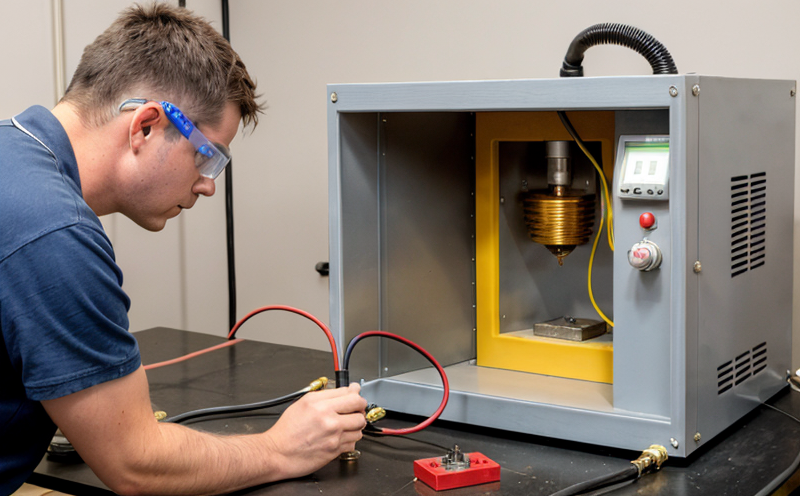ISO 60404-3 Magnetic Properties of Amorphous Alloys
The ISO 60404 series is a comprehensive set of standards that deals with the magnetic properties of amorphous alloys, which are materials characterized by their atomic structure lacking long-range order. This service focuses on ISO 60404-3: Determination of Magnetic Properties, specifically addressing the measurement and analysis of the magnetic behavior of amorphous metallic glasses.
The testing protocol outlined in ISO 60404-3 is vital for quality assurance, research and development (R&D), and compliance activities. Amorphous alloys are widely used in various sectors including electronics, aerospace, and automotive due to their unique properties such as high magnetic permeability and low coercivity.
The process involves precise measurement of key parameters like the initial magnetization curve (B-H loop) and hysteresis characteristics. The testing equipment typically includes a vibrating sample magnetometer or a superconducting quantum interference device (SQUID), which are capable of detecting even minor magnetic changes in samples as small as several milligrams.
Preparation of the specimen is critical for accurate results. This involves grinding the alloy into fine particles, ensuring homogeneity and minimizing contamination. The sample must be degaussed before testing to eliminate any residual magnetization that could skew the results. Once prepared, the specimens are placed in a controlled environment to ensure consistent temperature and humidity levels.
The test procedure begins with applying an external magnetic field to the specimen. The resulting change in the material's magnetization is measured as a function of the applied field strength. This data is then used to construct the B-H loop, which provides insight into the sample’s magnetic properties such as saturation magnetization and coercivity.
Understanding these characteristics helps engineers optimize alloy composition for specific applications like soft magnetic cores in transformers or magnetic shielding materials. For instance, a higher permeability can enhance efficiency in power transmission systems, while low coercivity improves recycling processes by minimizing energy consumption during demagnetization.
Compliance with ISO 60404-3 ensures that manufacturers meet international standards for quality control and product reliability. This is particularly important in industries reliant on advanced materials technology where even slight variations could lead to significant performance discrepancies or safety hazards.
A key aspect of this service lies in its ability to provide detailed reports highlighting the magnetic behavior under different conditions, including temperature and frequency effects. These insights are invaluable for R&D teams looking to innovate within the field of amorphous alloys.
In conclusion, ISO 60404-3 testing is essential for ensuring consistent product quality across various sectors. It enables manufacturers to optimize material properties, enhance performance, and maintain regulatory compliance. By leveraging this service, organizations can gain a competitive edge by delivering superior products that meet stringent international standards.
Benefits
Adopting ISO 60404-3 testing offers several advantages:
- Enhanced Quality Control: Ensures consistent product quality through rigorous magnetic property evaluation.
- Innovation Support: Provides valuable data for R&D activities, facilitating the development of new materials and technologies.
- Regulatory Compliance: Helps meet international standards for quality assurance and product reliability.
- Cost Efficiency: Identifies issues early in the production process, reducing waste and rework costs.
In addition to these benefits, this service also supports sustainable practices by minimizing resource wastage and promoting efficient use of materials throughout their lifecycle.
Industry Applications
The magnetic properties testing per ISO 60404-3 finds application across multiple industries:
- Electronics: Optimizing the design of components like inductors and transformers for enhanced performance.
- Aerospace & Defense: Ensuring high reliability and safety of magnetic shielding materials used in sensitive equipment.
- Automotive: Improving the efficiency of electric motors and generators through optimized material selection.
- Energy: Supporting the development of advanced wind turbine components that are lighter yet more efficient.
These applications underscore the importance of precise magnetic property testing in ensuring optimal performance, reliability, and compliance with industry standards.
Eurolab Advantages
EuroLab offers unparalleled expertise in conducting ISO 60404-3 magnetic properties testing:
- State-of-the-Art Equipment: Utilizing cutting-edge instruments like SQUID magnetometers to ensure accurate measurements.
- Experienced Technicians: Our team comprises highly trained professionals with extensive experience in materials science and testing.
- Detailed Reporting: Providing comprehensive reports that offer actionable insights for quality improvement and innovation.
- Comprehensive Support: Offering guidance throughout the testing process, from specimen preparation to data interpretation.
EuroLab’s commitment to excellence ensures that clients receive reliable results that meet international standards. This not only enhances product performance but also supports compliance with regulatory requirements in diverse sectors.





